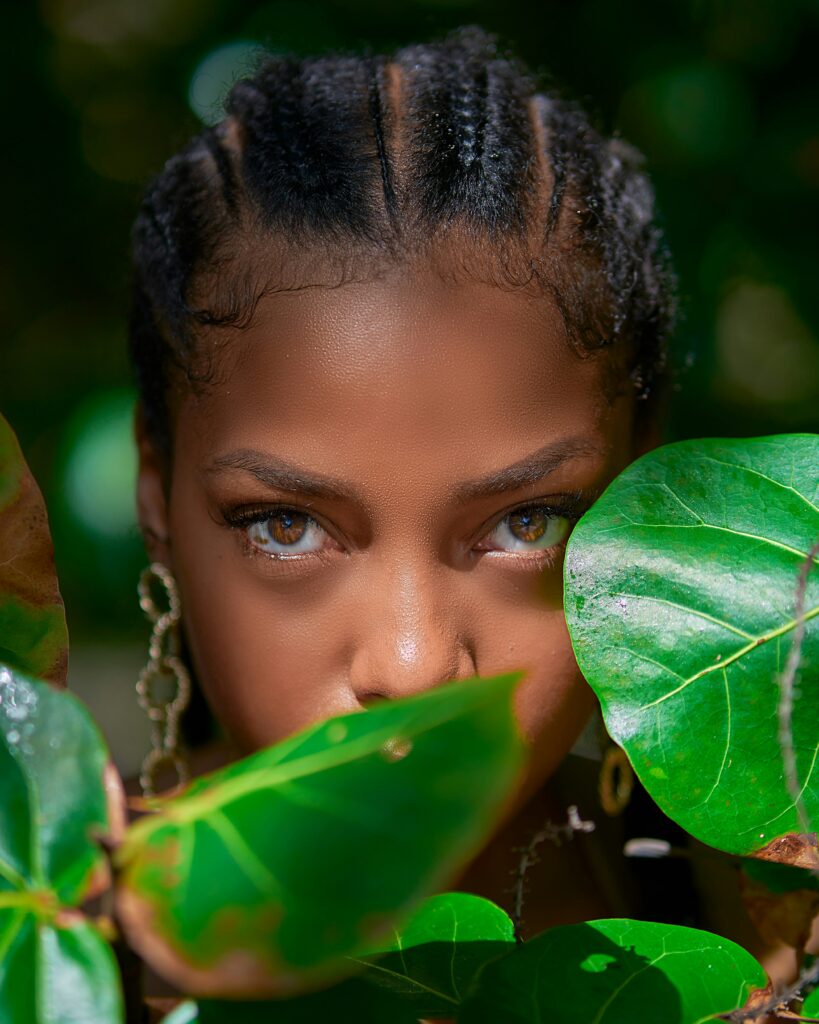
When I first sat down to write this blog post, the title immediately made me reflect: Goodbye Eurocentric Standards, Hello Black Beauty. This isn’t just a topic; it’s a revolution, and it holds profound significance for me as a Black woman and an author of self-help journals. Writing these journals has encouraged others to embrace their authentic selves, but in truth, it’s been a journey of self-acceptance for me, too. I realised that the messages I was sharing through my work—about healing, self-love, and resilience—were also my way of addressing something much deeper: my battle with beauty standards that were never meant to include me.
To unpack this, let’s start with the basics. Eurocentric beauty standards refer to the dominant ideals of beauty that are rooted in European culture and aesthetics. Historically, these standards favour features that align with European characteristics, such as light skin, straight or loosely curled hair, slim noses, and thinner body types. Colonialism, media representation, and societal norms have cemented these ideals over centuries.
The problem with Eurocentric beauty standards is that they are narrow and exclusive. They promote a singular image of what they consider beautiful, and for women who don’t fit that mold—particularly Black women—this can profoundly impact self-esteem and body image. These standards go beyond individual preference; they shape how society views beauty on a global scale and, more significantly, how we view ourselves.
Colonial power structures spread Eurocentric ideals for centuries, affecting how people perceived beauty worldwide. This led to the notion that features most commonly associated with Europeans were not just beautiful but superior. People in places like Africa, the Caribbean, and even in the West internalized these standards, often to the detriment of Black women. The remnants of these beauty ideals are still alive today, deeply ingrained in industries like fashion, Hollywood, advertising, and even everyday social interactions.
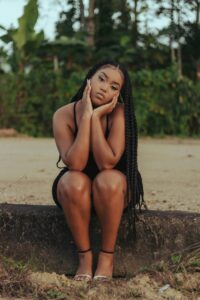
Growing up, I wasn’t immune to these standards. They shaped much of how I viewed myself. For many Black women, their lips and hips were often considered “too big,” and their skin tone and natural hair were rarely celebrated. Although people never scrutinized my lips and hips in this way, the messages about Black beauty still resonated deeply with me.
I spent hundreds of pounds at hairdressers on weaves and extensions, all in an attempt to have hair that conformed to the European ideal of straight, long locks. The products and services that catered to my natural hair or skin colour were limited. A few brands like Iman and Sleek often restricted foundation shades for women like me, highlighting a glaring absence of representation. This lack of inclusion didn’t chip away at my self-worth, but it was a frustrating reminder of how racism manifests even in beauty products.
But this wasn’t just my story—it’s the story of countless Black women. And it still is.
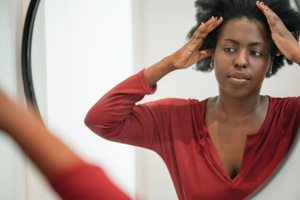
The pressure to conform to Eurocentric beauty standards can be suffocating. When the world repeatedly tells you that your natural appearance isn’t beautiful or acceptable, it’s hard not to internalise those messages. For many Black women, the impact of these standards is particularly damaging because it strikes at the core of our identity—our skin colour, our hair texture, our body shapes.
In my own life, the effect on my self-esteem came not just from societal pressure but from how Black males perceived attractiveness. The number of men attracted to me fluctuated noticeably depending on whether my hair conformed to the European standard of straightness. It was a stark reminder of how deeply these beauty ideals had infiltrated even within our communities.
Many Black women face similar experiences—being told that certain aspects of their appearance need to be “fixed” or “toned down” to be considered acceptable. This creates an internal conflict where we begin to question our inherent worth. If the world doesn’t see us as beautiful, how can we fully see ourselves that way?
Body image also suffers under the weight of these beauty ideals. Curves that are natural to Black women are often viewed through a distorted lens. When non-Black women sport the same features, they are celebrated, but when Black women display them, they are deemed “too much” or overly sexual. The message makes it clear: society only accepts your body when you present it in a way that fits a Eurocentric narrative.
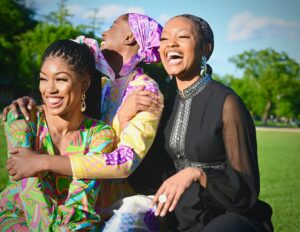 So, what does it mean to break free from Eurocentric beauty standards? For me, it has been a journey of unlearning, rediscovering, and embracing the beauty that was always there—within me and all Black women. It’s about understanding that beauty comes in many forms, and the more we redefine what it means to be beautiful, the more empowered we become.
So, what does it mean to break free from Eurocentric beauty standards? For me, it has been a journey of unlearning, rediscovering, and embracing the beauty that was always there—within me and all Black women. It’s about understanding that beauty comes in many forms, and the more we redefine what it means to be beautiful, the more empowered we become.
While I haven’t fully embraced my natural hair yet, I now make it a point to use wigs, weaves, or extensions that mimic the texture of Black hair. Seeing other Black women proudly embrace their natural hair has been inspiring, and when I encounter Black women with straight, “blow-away” hair, I often think of how unenlightened or even backward that choice seems now. I realise that’s how I looked and thought back in the day.
I also started seeking out representations of beauty that celebrated Blackness. This meant following social media influencers, reading books, and consuming media created by Black women for Black women. Seeing myself reflected in the world around me allowed me to realise that beauty is vast and diverse. There is no one way to be beautiful, and we should celebrate Black women for the full spectrum of our features.
There’s also been a broader movement of Black women embracing self-affirmation, which has been transformative. It’s not just about me—it’s about all of us. More and more Black women are praising their skin for its richness, their hair for its versatility, and their bodies for their strength. This collective rewriting of the narrative is essential for reclaiming confidence in our communities.
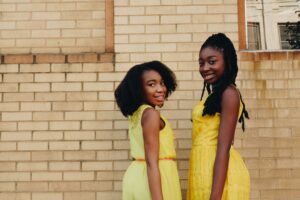 Breaking free from Eurocentric beauty standards isn’t just about personal transformation—it’s about changing the conversation for future generations. As a Black author of self-help journals, I want young Black girls to know that their beauty is valid. I want them to see themselves as beautiful without feeling pressured to conform to standards that never aimed to include them.
Breaking free from Eurocentric beauty standards isn’t just about personal transformation—it’s about changing the conversation for future generations. As a Black author of self-help journals, I want young Black girls to know that their beauty is valid. I want them to see themselves as beautiful without feeling pressured to conform to standards that never aimed to include them.
Representation matters. When Black women and girls see themselves celebrated, it sends a powerful message that they are enough just as they are. That’s why I make it a point in my writing to highlight the importance of self-acceptance and self-love, especially in the face of a society that often tells us otherwise. By creating spaces where we can affirm our beauty and lift each other, we’re doing the work of dismantling these harmful ideals.
Breaking free from Eurocentric beauty standards is a process, and it won’t happen overnight. But it’s a journey worth taking, for ourselves and for the generations of Black women who will follow. We owe it to ourselves to unlearn the harmful messages we’ve internalised and to embrace the fullness of who we are—our skin, our hair, our bodies. We are beautiful, and we always have been.
In reclaiming my beauty, I’ve found confidence, peace, and joy. I hope that by sharing this journey, more Black women will feel empowered to do the same. The world’s standards don’t define us—we define ourselves.
4-minute read Have you ever found yourself lying awake at night, heart heavy with worry about your teenager’s safety during interactions with the police? It’s a question that lingers for many parents and caregivers, especially when history and statistics both
4-minute read I’ve spent a lot of time thinking about beauty—what it means, who gets to define it, and whether it’s really as inclusive as we like to think. And the more I look at it, the more I realize
4-minute read Let’s be honest—the Hidden Agenda Behind Beauty Ads is everywhere. They follow us on our phones, pop up in our social feeds, and even sneak their way into our subconscious when we least expect it. One minute you’re